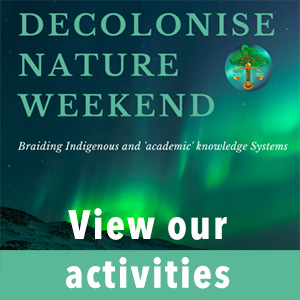Transdisciplinary Insights: Decolonize Nature Challenge
Mercy Gloria Ashepet, Alena Clark, Mathijs Geerts Danau, Naina Goel, Luan Kahili, Sondre Løcka, Celeste Maes, Sofie Ulrix, Matthias Van Ongevalle, Wangari Wambui, Zheng Zhou, enrolled as students at KU Leuven
With Liesl Roos from PXL MAD and Amon Mugume curator of Natural History at the Uganda Museum
 Decolonizing Nature is a broad yet an ambiguous concept that can mean different things for different people.
Decolonizing Nature is a broad yet an ambiguous concept that can mean different things for different people.
This was no different to the members of the challenge, and hence necessitated the need for several debates and educational sessions to begin to comprehend such a complex problem.
Robin Wall Kimmerer’s book “Braiding Sweetgrass” discussed how indigenous wisdom may work with scientific knowledge, and inspired the group’s conversation about what decolonization looked like and how to represent such insights.
Other activities included hosting a webinar focused on the “Custodians of Nature” in Uganda regarding incorporating traditional knowledge in modern practices, as well as interviewing Dr. Mamphela Ramphele on economic and community activism.
After several sessions and activities, the group agreed that for nature to reach a state of decolonisation, both indigenous and scientific knowledge systems have to complement each other. The following are some of the possible processes that we came up with to guide our discussions and work towards achieving the task: the first one involved creating a platform representing marginalized opinions; the second one is to step away from anthropocentric definitions of ecology and bring about change in our minds, and lastly to respect and listen to the indigenous knowledge based on nature and balance it with modern science.
These processes represent the first steps towards listening to indigenous knowledge based on nature, and balancing it with modern science.
The next step for the Decolonize Nature challenge involves emphasizing community engagement and education on the concept through a “Decolonize Nature Weekend” happening in May.
This final project aspires to raise awareness of the need to decolonize nature and incorporate indigenous knowledge with scientific knowledge systems.

